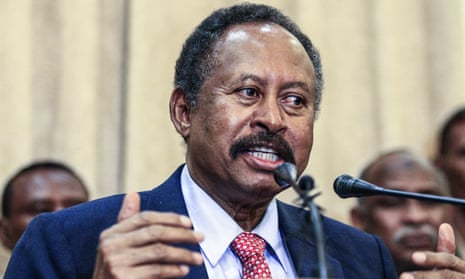Sudan’s prime minister has announced his resignation amid political deadlock and widespread pro-democracy protests following a military coup that derailed the country’s fragile transition to democratic rule.
Abdalla Hamdok, a former UN official seen as the civilian face of Sudan’s transitional government, had been reinstated as prime minister in November as part of an agreement with the military following the October coup. In that time he had failed to name a cabinet and his resignation on Sunday throws Sudan into political uncertainty.
In a televised national address, Hamdok called for a dialogue to agree on a “national charter” and to “draw a roadmap” to complete the transition to democracy.
“I decided to return the responsibility and declare my resignation as the prime minister,” he said, adding that his stepping down would allow a chance for another person to lead the nation and complete its transition to a “civilian, democratic country”.
The prime minister warned that the ongoing political stalemate since the military takeover could become a full-blown crisis and damage the country’s already battered economy.
The October coup upended Sudan’s plans to move to democracy after a popular uprising forced the military’s overthrow of longtime autocrat Omar al-Bashir and his Islamist government in April 2019.
Hamdok’s resignation comes amid a heavy security crackdown on protesters denouncing the military’s takeover and a subsequent deal that reinstated him and sidelined the pro-democracy movement.
He was reinstated in November amid international pressure in a deal that calls for an independent technocratic cabinet under military oversight led by him.
On Sunday, prior to his resignation, Sudanese security forces violently dispersed pro-democracy protesters, killing at least two people, a medical group said. The demonstrations were the latest to protest against a military coup that rattled the country’s fragile transition to democracy.
Thousands had taken to the streets in Khartoum and other cities across the country to denounce the October takeover, and a subsequent deal that reinstated the prime minister but sidelined the pro-democracy movement.
The Sudan Doctors Committee, which is part of the pro-democracy movement, said one of the dead was hit “violently” in his head while taking part in a protest march in Khartoum. The second was shot in his chest in Khartoum’s twin city of Omdurman, it added.
The group said dozens of protesters were injured.
Nazim Sirag, an activist, said security forces used teargas and sound grenades to disperse protesters, and chased them in side streets across the capital.
Protests also took place in other cities including Port Sudan and Nyala in the Darfur region.
The protests came despite tightened security and blocked bridges and roads in Khartoum and Omdurman. Internet connections were also disrupted before the protests, according to advocacy group NetBlocs. Authorities have used such tactics repeatedly since the 25 October coup.
Sunday’s fatalities have brought the death toll among protesters since the coup to at least 56, according to the medical group. Hundreds have also been wounded.
Allegations surfaced last month of sexual violence, including rape and gang-rape by security forces against female protesters, according to the United Nations.
The ruling sovereign council has vowed to investigate violence against the protesters.
On Saturday, the US secretary of state, Antony Blinken, urged security forces to “immediately cease the use of deadly force against protesters” and to hold those responsible for violence accountable.
He also called for Sudanese leaders to accelerate their efforts to form a “credible cabinet”, an interim parliament and judicial electoral bodies that will prepare for the country’s planned 2023 elections.
The rotating leadership of the sovereign council now chaired by Gen Abdel-Fattah Burhan should be transferred to a civilian as was planned before the coup, Blinken said.
“We do not want to return to the past, and are prepared to respond to those who seek to block the aspirations of the Sudanese people for a civilian-led, democratic government,” he added.
